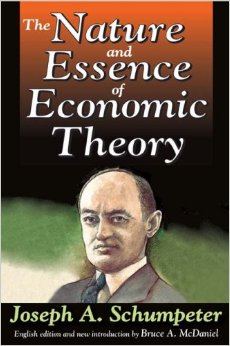McDaniel, Bruce A. (trans.), New Brunswick, New Jersey: Transaction, 2009, 490 pp.
From Amazon:
In a tribute to Joseph A. Schumpeter, a great figure in the history and development of economics, this work brings together for publication his brilliantly crafted lectures delivered more than a century ago. In The Nature and Essence of Economic Theory, now available for the first time in the English language, the reader will find absolute dedication to the search for an economic science, apart from and in rejection of moral or political dogma.
The Nature and Essence of Economic Theory works out what people should think of pure economics, what its nature is, what its methods and findings are, and where thought takes off from there. The book shows the limitations and weaknesses of nineteenth-century economics and how the field could be and was improved. To convey his arguments, Schumpeter uses certain axioms that form a consistent, self-contained system and show its value, and also how far a sound economics is based on facts and events rather than presuppositions or definitions. Schumpeter, along with others, introduced a fundamental differentiation between “statics” and “dynamics” in the economy.
Schumpeter’s larger aim, beyond a pedagogic tool, was to deduce changes of the events in the market, trade, and exchange of goods and services. He called his equilibrium model “explanation” in a world without undue surprises. He defined the task of economy as the description of the system and its change tendencies. If that can be achieved unequivocally, without resorting to doctrine or dogma, then the field can be considered self-contained.
Online:
Amazon

